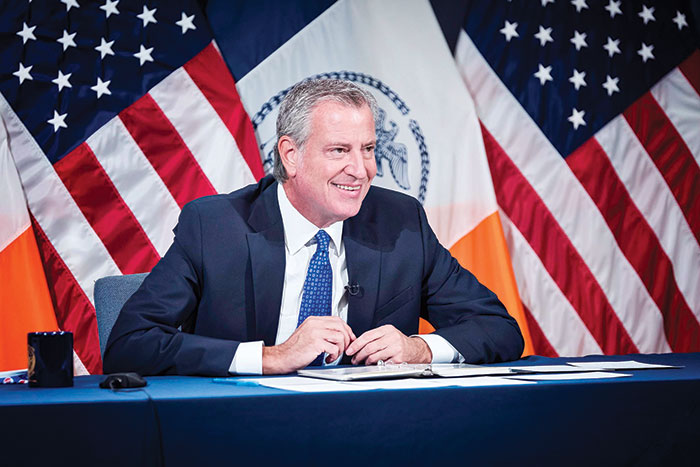Photo Courtesy of Ed Reed/Mayoral Photography Office
Mayor de Blasio said that “this institute will put our hardest-learned lessons to work so that when the next public health crisis emerges, New York City will not only be prepared, we will be ready to lead these global fights.”
By Forum Staff
Columbia University will launch and operate the Pandemic Response Institute, with its key partner, the CUNY Graduate School of Public Health and Health Policy, and several community, research, and industry partners, Mayor Bill de Blasio recently announced.
The PRI will be supported by up to $20 million in City capital funding for eligible costs and be dedicated to preparing New York City for future health emergencies and epidemics in a more effective and equitable manner, while positioning the city as a global leader to serve as a model for public health response.
The City Economic Development Corporation, Department of Health and Mental Hygiene, and the Office of Emergency Management reviewed and selected Columbia to launch this institute with a key partnership with CUNY SPH as well as other collaborators, following a Request for Proposals in April. The university, through its Mailman School of Public Health, put forth an ambitious and compelling vision for the PRI, which was supported by an impressive and robust multi-sector group of partners, while looking to ensure all New Yorkers are prepared for future public health emergencies by having access to health solutions, information for decision-making, and the capacity to prepare and respond.
“The Pandemic Response Institute, operated by Columbia University with key partner CUNY SPH, will play a critical role in preparing for future pandemics, and promoting equity in public health,” de Blasio said. “Born out of New York’s quick action during the early days of the pandemic, this institute will put our hardest-learned lessons to work so that when the next public health crisis emerges, New York City will not only be prepared, we will be ready to lead these global fights.”
The PRI will specifically focus on:
- Building or strengthening technologies and systems to support real-time data collection and sharing
- Driving cutting-edge research on public health innovation and creating capacity to rapidly scale technological solutions in future public health emergencies
- Piloting community-based partnership models and workforce training programs that improve emergency preparedness and advance health outcomes across all communities
- Centering racial equity in all activities of the Institute and addressing gaps in health infrastructure that have disproportionately caused harm to communities of color and others facing structural inequities.
The PRI will bring together communities, nonprofit organizations, industry, and academic institutions, and coordinate with City agencies in activities related to and within the entire public health emergency cycle. These partnerships will help the institute to advance research, training, and innovation, administration officials said.
“I applaud the Mayor and the NYCEDC on their investment in prevention of future pandemics in our city, and on their utilization of the incredible resources we already have in their selection of Columbia University as their partner in this endeavor,” City Councilman Paul Vallone (D-Bayside) added. “We can be confident that with this new Pandemic Response Institute we will never be caught unawares by a health crisis of this magnitude again.”
The institute will begin activities this year and plans to launch a community-based location in each borough, de Blasio noted.

